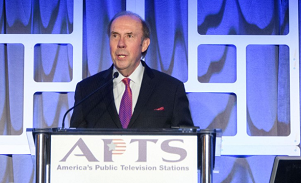APTS' Butler: Noncom Funding is Secured...For Now

The smarter way to stay on top of broadcasting and cable industry. Sign up below
You are now subscribed
Your newsletter sign-up was successful
America's Public Television Stations President Patrick Butler says noncommercial media have won the latest round of budget battles with President Donald Trump, thanks to bipartisan help from Congress, but that it will require continued vigilance to secure continued funding.
In a speech to open APTS' three-day D.C. summit, whose theme is The Power of Public Media and which will including a lobbying day on the Hill, Butler pointed out that while President Donald Trump had again tried to zero out the 2019 budget for noncommercial media--it is currently $445 million--he had failed to do so last time around--its 2018 budget (per the 2017 appropriations bill) is $445 million, plus more for the Ready to Learning project and interconnection funding--and was likely to be rebuffed by Republicans and Democrats in this attempt as well.
Butler said last year at this time, public media's fate was unclear, with the President's defunding threat and the House and Senate in Republican hands. He called it the biggest existential threat to noncoms in a decade, but one that had been rebuffed, thanks to their millions of "real friends," who had made their voices heard. "We passed every test and our funding has been secured," he said.
Butler said that it also took courageous stands by supporters on both sides of Capitol Hill. He said he could look with growing confidence to a day "when support for public broadcasting will be as near universal in the Halls of Congress as it is in the hearts of our countrymen."
He said that collective defense from the public, public media outlets, and Congress had come against extraordinary odds, "and we have won." As for the 2019 budget fight: "We are ready for the battle," he said, appearing confident of victory. "There is power in such passionate and widespread support," he said.
Related: POTUS Takes New Aim At Public Media
Butler also suggested that funding public media in a time of divisive discourse was even more important, speaking eloquently about the relevance of public broadcasting's mission.
"In a world as riven as ours, in a world bristling with danger, a strong and vibrant public media system with its civilizing influence, the greatest power we have, may be more important now than ever before."
The smarter way to stay on top of broadcasting and cable industry. Sign up below
Also of importance, he said, was the new power broadcast media will have thanks to the rollout of the new ATSC 3.0 broadcast transmission standard. Sinclair, one of the major proponents of that standard and a "diamond" sponsor of the conference, may be teaming up with some noncom stations to divvy up the transmissions--the FCC is requiring stations to partner up so one can deliver the ATSC 3.0 signals and the other the 1.0 signals of both stations, since the standard is not backwards compatible.
Related: Senate Appropriations Approves Level Funding for CPB
Butler said rolling out ATSC 3.0 will require a "special commitment" of the time and talents of his members, but that the rewards would include not only the "breathtaking" advances in picture and sound quality, but interactivity, added channel capacity, signal coverage, enhanced spectrum efficiency, and other "transformative" opportunities including updated emergency alert capability to wake up cell phones and TV sets, the ability to send huge files of content to areas where traditional broadband coverage may be years away. Then there is the spectrum capacity that can be leased--say, for wireless backhaul--"after all your programs and public service commitments have been met."
He said APTS is still considering an offer to join a consortium formed to help aggregate and market that leased spectrum opportunity, an opportunity that could mean more financial power for noncommercial media, he said.
Butler praised the House Energy & Commerce Committee for boosting the $1.75 billion post-incentive auction TV station repack fund as part of an FCC reauthorization bill that passed unanimously out of that committee this month. He praised the committee chairman, Greg Walden (R-Ore.), himself a former broadcaster and 2013 "Champion of Public Broadcasting," for pushing the spending increase.
He said if the reauthorization were added to the omnibus appropriations bill, "it will solve a big problem for us and save some of our stations from the prospect of going dark for insufficient funds."
The APTS president did not have a lot of good things to say about the incentive auction. "In the end, the auction benefitted a few public television stations, enticed but then disappointed many others, and risked leaving gaping holes in our national coverage, risks that thankfully never materialized, and distracted an entire industry for five years."
Contributing editor John Eggerton has been an editor and/or writer on media regulation, legislation and policy for over four decades, including covering the FCC, FTC, Congress, the major media trade associations, and the federal courts. In addition to Multichannel News and Broadcasting + Cable, his work has appeared in Radio World, TV Technology, TV Fax, This Week in Consumer Electronics, Variety and the Encyclopedia Britannica.

